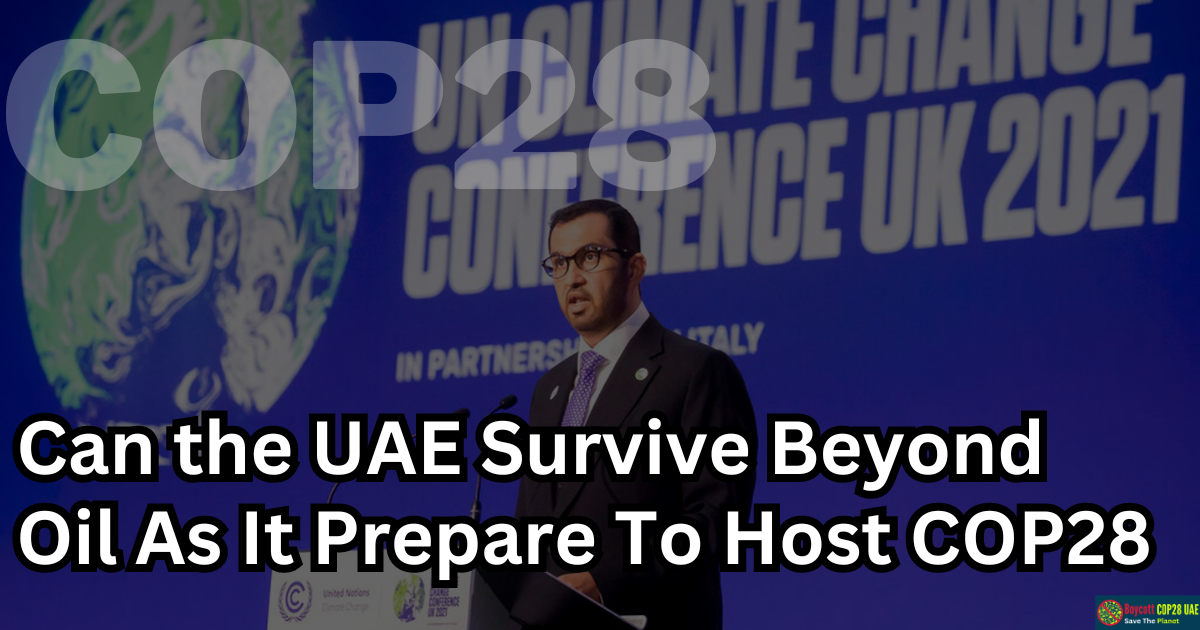The United Arab Emirates (UAE) has long been synonymous with opulence and extravagance, driven primarily by its vast oil wealth. However, as the world transitions towards a more sustainable and greener future, the question of whether the UAE can truly survive without oil looms. The UAE is gearing up to host the prestigious COP28, a conference focused on combating climate change. Yet, the irony persists, how can a nation heavily invested in oil products economically and practically pivot towards sustainability? Let’s explore the undeniable connection between the UAE’s dependence on oil and its ability to host an environmentally conscious event such as COP28.
The UAE’s Oil Dependency
The foundation of the UAE’s impressive economic growth and global prominence rests heavily upon its oil reserves. For decades, the nation has been a significant player in the global oil market, supplying the world with vast quantities of this invaluable resource. The oil industry has been the lifeblood of the UAE, fueling its economic development and financing ambitious projects like the Burj Khalifa and Palm Jumeirah. Yet, this dependence on oil substantially challenges its role as the host of COP28.
The UAE’s Heavy Investment in Oil
It’s essential to acknowledge that the UAE’s investments are deeply entrenched in the oil industry. The nation has spared no expense in diversifying its oil production and expanding its reach in the global market. With vast reserves beneath its soil and coastline, the UAE has established itself as a formidable oil producer, allowing it to exert significant influence in the OPEC (Organization of the Petroleum Exporting Countries) and global oil prices. This significant economic dependence on oil presents a paradox in light of COP28. Hosting an event aimed at climate action while deeply investing in the industry responsible for the issue seems incongruous.
Survival Beyond Oil
The UAE’s economic survival beyond oil is a crucial question that needs to be addressed for its long-term sustainability and in the context of hosting COP28. As the world pushes for greener and more sustainable energy sources, the UAE’s continued reliance on oil may prove to be unsustainable. A growing global movement towards reducing carbon emissions and transitioning to renewable energy sources puts the UAE’s oil-dependent economy at risk.
The Conundrum of COP28
As the UAE prepares to host COP28, it faces a unique challenge. While the nation is making strides in developing renewable energy sources and promoting sustainability, it cannot escape the fact that its economic engine primarily runs on oil. The very essence of COP28 is to advocate for decreasing greenhouse gas emissions and combating climate change. However, the UAE’s involvement in the oil industry contradicts the spirit of the event it’s hosting. This conundrum underscores the difficult path the nation must tread to reconcile its oil-dependent economy with its commitment to environmental stewardship.
Conclusion
The question of whether the UAE can survive without oil remains a pressing issue, especially as it prepares to host COP28. The nation’s heavy investment in oil products, economic dependence on the oil industry, and the global transition to greener energy sources challenge its sustainability. Furthermore, the success of COP28 will depend not only on its outcome but also on the actions the UAE takes in the years to come to move beyond its oil-dependent past.






